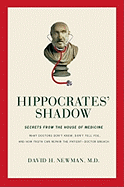

Newman is no radical seeking to turn the medical establishment on its head, and if he has an axe to grind it isn't apparent in the way he quietly, but persistently, advances his claims. The heritage of Hippocrates, Newman asserts, rests on the bedrock of honesty between physician and patient. Today, sadly in his view, everything about our health care system operates to undermine that fragile bond. "In our system, communication has been cast aside as a trivial component of medical care and a nonentity in medical education," he writes, "dwarfed by what we perceive to be the great potency and authority of medical science." The result is no more satisfying to physicians than it is to patients.
Blending case studies from his own experience and analysis of cutting edge medical research, in each chapter Newman addresses one of medicine's "secrets," from the fact that doctors don't know what causes back pain or multiple sclerosis to their disturbing reluctance to abandon cherished myths ("pseudo axioms," as he calls them) in the face of overpowering statistical evidence. Did you know that studies of 130,000 women shows there's no benefit from routine screening mammograms in preventing deaths from breast cancer? Or that there's nothing to be gained--and much potential harm--from routinely prescribing antibiotics for strep throat? Newman's candid description of the way doctors disagree in their reading of chest x-rays and electrocardiograms will give you pause when it's time for your next annual physical.
In case after case, Newman eloquently argues (with considerable support from peer-reviewed medical literature) that much of modern medicine's conventional wisdom lacks either scientific validation or any rationale grounded in human behavior or psychology. Instead, he contends, we've been seduced into accepting as the ideal health care system one that rests on two vaunted but ultimately unreliable twin pillars--tests and pills.
Today politicians, economists, insurance industry representatives and health care professionals debate the changes that must occur in an American health care system that critics and consumers alike agree is broken in fundamental ways. Perhaps, David Newman suggests, the first tentative answers to our problems have to be sought not at the macro level but in the quiet of the examining room. Maybe Marcus Welby was on to something.--Harvey Freedenberg
Shelf Talker: A thoughtful physician explores the ways in which lack of candid communication between doctors and patients has contributed to the crisis in American health care and offers a frank prescription for how to fix it.

